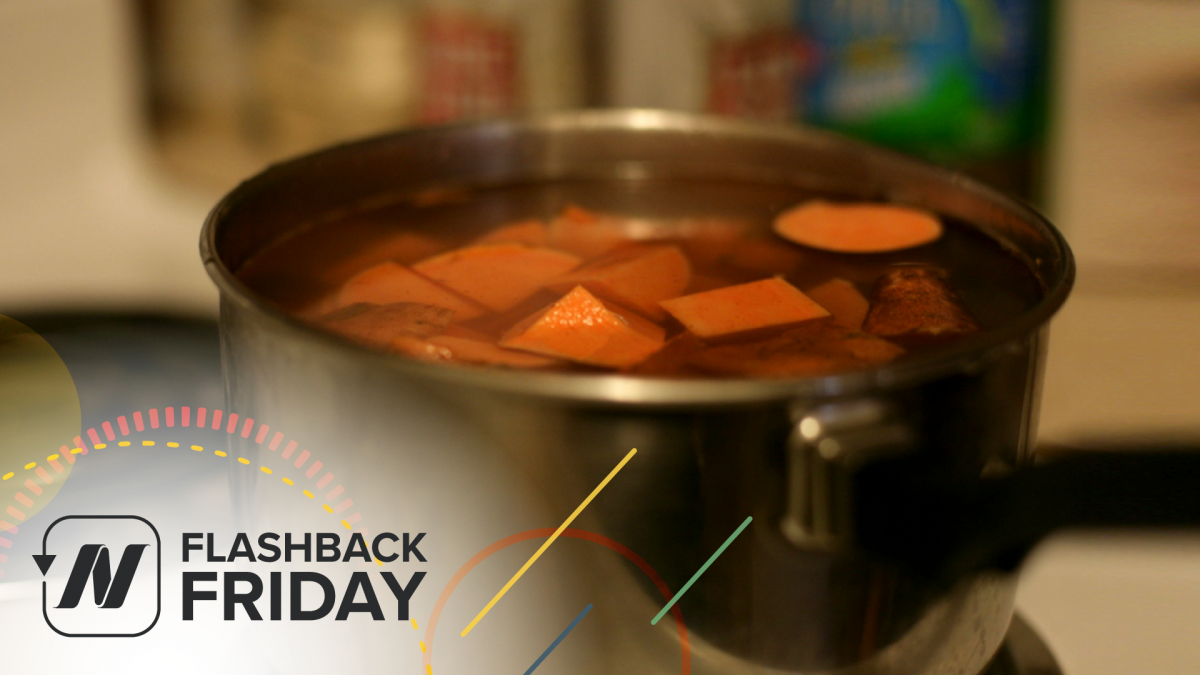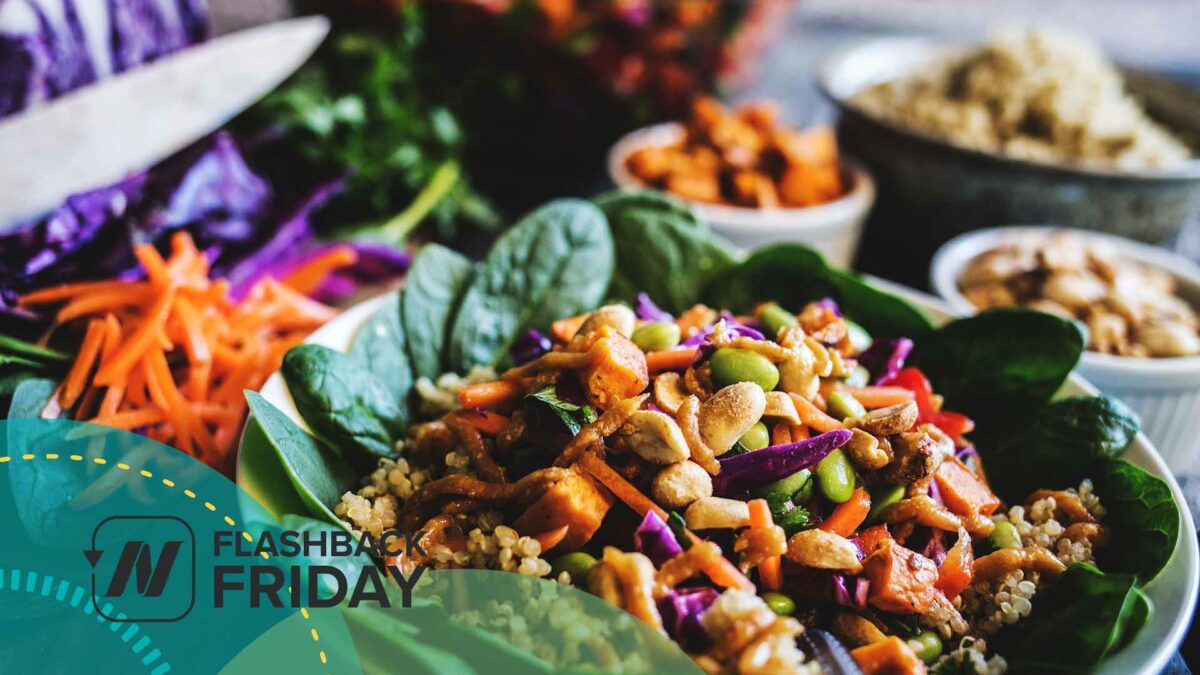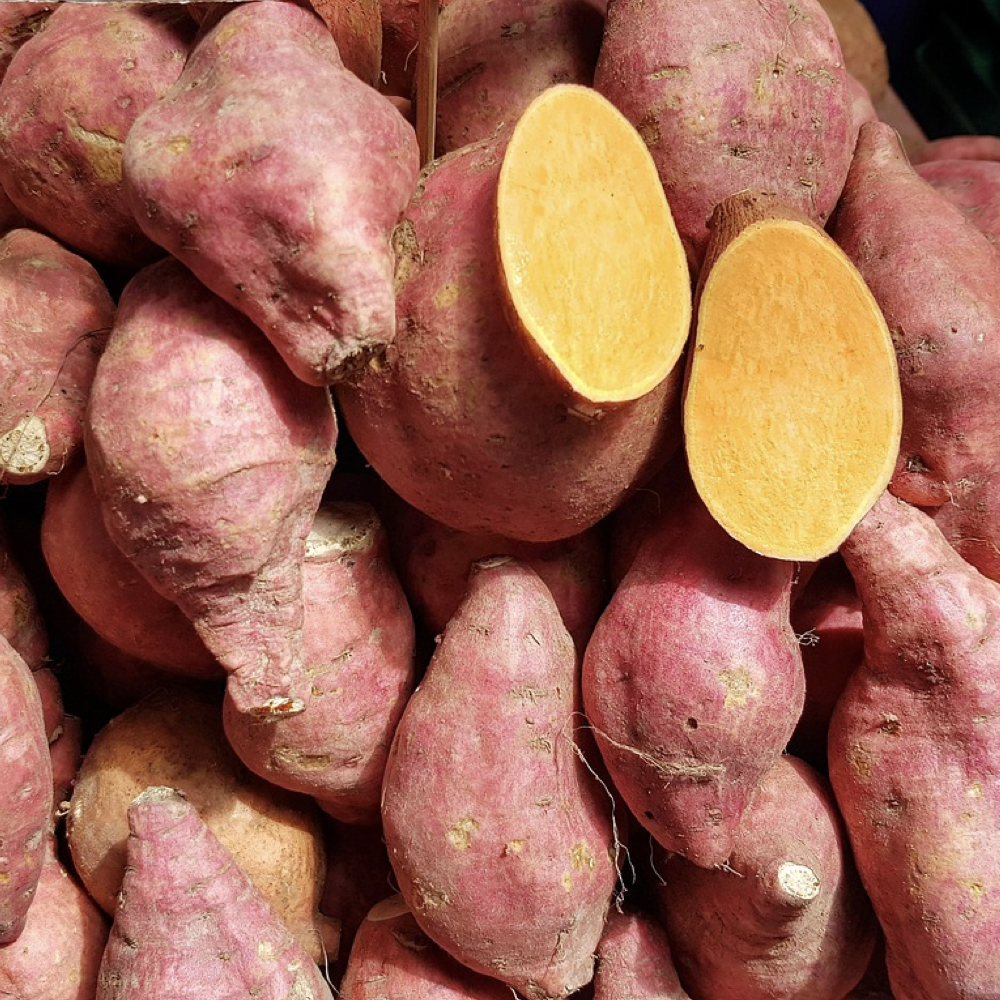
Sweet Potatoes
Learn more about the latest evidence-based research on sweet potato nutrition facts in the videos below.
What did the mammoth Global Burden of Disease Study identify as the primary cause of Americans’ death and disability? The typical American diet—with inadequate vegetable intake as our fifth-leading dietary risk factor, nearly as bad as our consumption of processed meat.
Indeed, a more plant-based diet may help prevent, treat, or reverse some of our leading causes of death, including heart disease, type 2 diabetes, and high blood pressure, and may improve not only body weight, blood sugar levels, and ability to control cholesterol, but also our emotional states, including depression, anxiety, fatigue, sense of well-being, and daily functioning.
Sweet potatoes are one of my favorite vegetables, and I regularly eat them to check off the “other vegetables” boxes on my Daily Dozen checklist. During harsh Boston winters while I was in medical school, I would take two freshly microwaved sweet potatoes and pop them into my coat pockets to keep my hands warm. After they cooled down, healthy snacks on the go! It’s actually better to boil them to best preserve their nutritional content, but regardless of the cooking method, keep on the skin as its peel has nearly ten times the antioxidant power as the inner flesh (on a per-weight basis), giving them an antioxidant capacity approaching that of blueberries.
Sweet potatoes are among the healthiest common whole-food sources of potassium, which every cell in our body requires to function. In fact, they can be considered a superfood and are ranked as one of the healthiest foods on the entire planet. Sweet potatoes are among the healthiest and cheapest, with one of the highest nutrient-rich food scores per dollar. When picking out varieties at the supermarket, remember that a sweet potato’s nutritional content is tied directly to the intensity of its color. The more yellow or orange its flesh, the healthier it may be, and purple sweet potatoes are even healthier!
For substantiation of any statements of fact from the peer-reviewed medical literature, please see the associated videos below.
Image Credit: Pixabay. This image has been modified.
Popular Videos for Sweet Potatoes


Flashback Friday: The Best Way to Cook Sweet Potatoes
How does sweet potato baking compare to boiling and steaming, and should we eat the...
Flashback Friday: The Okinawa Diet – Living to 100
What would happen if you centered your diet around vegetables, the most nutrient-dense food group?All Videos for Sweet Potatoes
-

The Third Way to Boost NAD+
How can we conserve NAD+ by preventing overactivation of the enzymes PARP-1 and CD38, which guzzle NAD+?
-

The Benefits of Saffron for Treating Age-Related Macular Degeneration
Eight threads of saffron a day can improve visual acuity in older adults with mild or moderate age-related macular degeneration.
-

The Best Foods for Your Skin
Greens, apples, tomato paste, and grapes are put to the test as edible skin care candidates.
-

The Best Way to Boost NAD+: Supplements vs. Diet (webinar recording)
The pros and cons of all the NAD+ supplements and what are the ways to boost NAD+ naturally with diet and lifestyle?
-

Centrum Multivitamin, Vitamin C, Beta Carotene, Souvenaid, Zinc, or Calcium Supplements for Preventing Alzheimer’s?
Which might actually make cognition worse: Centrum multivitamin, vitamin C, beta carotene, Souvenaid, zinc, or calcium supplements?
-

How to Boost Collagen Synthesis with Diet
Which foods can increase collagen deposition and prevent wrinkles?
-

Soul Food That’s Good for the Soul
The best of soul food’s origins are tied to the plant-centric West African diet.
-

Dr. Greger in the Kitchen: Groatnola
Dr. Greger whips up another of his go-to breakfast meals.
-

The Harms Associated with Eating More Southern-Style Food
Diet appears to mediate the majority of the racial health gap.
-

Potential Vitamin and Mineral Deficiency Risks on a Vegan Diet
What is the best way to get the nutrients of concern on a plant-based diet?
-

Vegetarians and Stroke Risk Factors—Animal Protein?
Might animal protein-induced increases in the cancer-promoting grown hormone IGF-1 help promote brain artery integrity?
-

Best Way to Cook Vegetables
Boiling, steaming, microwaving, air frying, and sous vide cooking are put to the test for nutrient retention.
-

Does Adding Milk Block the Benefits of Coffee?
How to choose the healthiest coffee, and the effects of adding milk vs. soymilk.
-

Lead Contamination in Fish and Game
Most hunters may not be aware about the health risks related to consuming meat from animals shot with lead ammunition.
-

Lycopene Supplements vs. Prostate Cancer
High doses of lycopene—the red pigment in tomatoes—were put to the test to see if it could prevent precancerous prostate lesions from turning into full-blown cancer.
-

Benefits of Turmeric for Arsenic Exposure
What happened when turmeric curcumin was put to the test to see if it could reverse DNA damage caused by arsenic exposure?
-

What About Coconuts, Coconut Milk, and Coconut Oil MCTs?
Do the medium-chain triglycerides in coconut oil and the fiber in flaked coconut counteract the negative effects on cholesterol and artery function?
-

Lowering Our Sodium-to-Potassium Ratio to Reduce Stroke Risk
The potassium content in greens is one of two ways they can improve artery function within minutes of consumption.
-

How to Treat Endometriosis with Seaweed
Five cents’ worth of seaweed a day may dramatically improve a major cause of disability and compromised quality of life among women.
-

Eating More to Weigh Less
Energy density explains how a study can show participants lose an average of 17 pounds within 21 days while eating a greater quantity of food.
-

Industry Response to Plants Not Pills
The whole food is greater than the sum of its parts: how unscrupulous marketers use evidence that ties high blood levels of phytonutrients with superior health to sell dietary supplements that may do more harm than good.
-

The Okinawa Diet: Living to 100
What would happen if you centered your diet around vegetables, the most nutrient-dense food group?
-

Can Oatmeal Reverse Heart Disease?
Less than 3% of Americans meet the daily recommended fiber intake, despite research suggesting high-fiber foods such as whole grains can affect the progression of coronary heart disease.
-

The Best Way to Cook Sweet Potatoes
How does sweet potato baking compare to boiling and steaming, and should we eat the skin?
-

Anticancer Potential of Sweet Potato Proteins
Sweet potatoes are not just one of the healthiest and cheapest sources of nutrition; the predominant protein is a type of protease inhibitor that may have cancer-fighting properties.
-

Cancer Risk from French Fries
The association between cancer and the consumption of deep-fried foods may be due to carcinogens formed at high temperatures in animal foods (heterocyclic amines and polycyclic hydrocarbons) and plant foods (acrylamide).
-

Cavities and Coronaries: Our Choice
Coronary heart disease, our #1 cause of death, was found to be almost non-existent in a population eating a diet centered around whole plant foods.
-

Preventing Breast Cancer by Any Greens Necessary
Which was associated with lowest breast cancer risk in African-American women? Apples, bananas, broccoli, cabbage, cantaloupe, carrots, collard greens, grapefruit, oranges, spinach, tomatoes, or sweet potatoes?
-

Neurobiology of Artificial Sweeteners
The disconnect between sweetness sensations coming from our tongue, and the lack of a caloric feedback loop in the gut, may result in overeating.
-

Anti-Inflammatory Effects of Purple Potatoes
Antioxidant, anti-inflammatory properties of white compared to yellow and purple potatoes. Purple potatoes may also help lower high blood pressure.
-

Antioxidants in a Pinch
Some herbs and spices—including cinnamon, cloves, lemon balm, marjoram, oregano, and peppermint—are so rich in antioxidants that just a small pinch can go a long way.
-

Bowels of the Earth
Which country has the largest (and smallest) average stool size?
